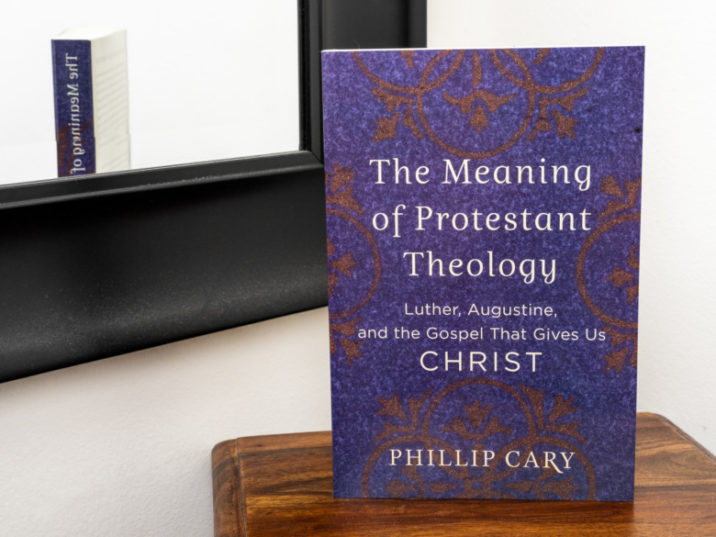by Phillip Cary
The key concept in The Meaning of Protestant Theology is there in the subtitle: The Gospel that Gives Us Christ. That’s the core of Protestant theology and the key to its meaning, as well as the center of the distinctively Protestant piety of the Word. The Gospel of Jesus Christ is the most fundamental form of what Christian traditions call “means of grace,” which is to say: the ways God gives his own Son as our savior, our righteousness, and our eternal life. When Catholics think of “means of grace,” they think first of sacraments. The Eastern Orthodox may think first of icons. But Protestants think first of the saving power of the Word of God, without which there are no sacraments and icons lose all meaning. Every form of Christian piety needs the Gospel of Jesus Christ if it is to have any meaning at all. So the Protestant piety of the Word, centered on the Gospel, is a gift to the whole Christian tradition.

The Gospel is a Word with saving power because it gives us Christ. This key concept explains why the practice of preaching has been at the heart of Protestant theology. To preach the Gospel is to give people Christ, to bring him right into their ears, so that the Holy Spirit may bring him all the way into the depth of their hearts. And to have Christ in the heart is to have salvation, the righteousness and holiness of God, and eternal life. This is why Protestant theology ever since Luther has been committed to the teaching that we are justified by faith alone. The way the Holy Spirit brings justification, grace, and salvation to us is by opening our hearts to receive in faith the Gospel that good preaching puts in our ears.

It is a lot like learning a favorite song. We sing it over and over again as we learn it by heart and take joy in it. It becomes part of our life for the rest of our days—something essential to who we are. To know me is to know something of the songs and prayers I bear in my heart. You don’t really know who I am if you don’t know that I have been praying the Lord’s prayer like a favorite song ever since I was a child, and I will not forget it on the day I die. This is part of how I bear Christ in my heart: praying the words he has given us, believing his promises, singing the songs and celebrating the liturgies that preach the Gospel so that Christ may dwell in our hearts by faith. These are all means of grace, because they tell his story and make me part of it—a sinner for whom Christ died. The Gospel is in them all, a word of comfort and joy and victory that has been shaping my heart for my whole life, so that I might be renewed in the image of God.

This is why it is important to understand the meaning of Protestant theology. The book focuses on Martin Luther, the founding figure of Protestantism who put the Gospel of Jesus Christ at the center of Christian theology and Christian life. From Luther we can learn that the Gospel saves us not by giving us rules to follow, or work to do, or practical advice about how to change our lives, but by telling us the story of Christ and his promises. For God is true to his word and keeps his promises. Therefore salvation is ours when we hear the story of Christ, what he has done and what he has promised, and realize that it is for us he came and did these things. The promise is for us and our children, so that we may take hold of this Son of God by faith and gladly sing: I am my Beloved’s and he is mine.

Professor Phillip Cary is the Scholar-in-Residence at Templeton Honors College, Eastern University and the Editor of Pro Ecclesia: A Journal of Catholic and Evangelical Theology.
Take advantage of the prepub pricing of The Meaning of Protestant Theology before the book ships, and get your copy at significant savings!






